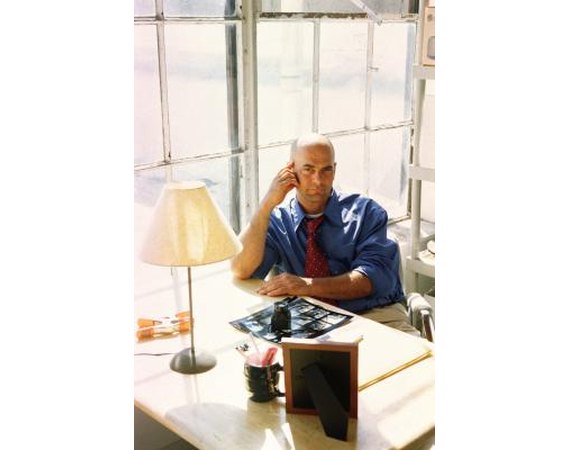
With the invention of digital cameras, fewer photographers rely on cameras that use film. Still, for those photographers who enjoy developing film and printing photographs from the negatives, a proof sheet is a useful tool for photographers. A proof sheet, also known as a contact sheet, provides the photographer with small thumbnail images of their entire roll of film and allows the artist to select which photos to enlarge and print.
Instructions
- 1
Develop the film. After the negatives have dried, trim them so they can fit in rows on the photography paper.
2Go to the dark room. Shut the door, turn off the regular room lights and turn on the photo-safe red lights. Make sure the developing chemicals are poured in their respective trays so you can develop your contact sheet.
3Set up the enlarger, adjusting it up or down so it will emit enough light to cover the entire sheet of photo paper. Adjust the amount of light it produces, as well, so it emits a moderate amount.
4Lay a piece of photography paper on the enlarger base, where the enlarger light will reach it. Spread the negatives over the paper's surface. Hold the negatives in place with a sheet of glass over the entire surface of the photography paper and negatives.
5Turn on the enlarger and expose the paper to light for several seconds; the precise time depends on the specifications of your equipment.
6Remove the glass and the negatives from the piece of paper. Develop the paper. After it dries completely, you will have a proof sheet which displays all of the photographs you've taken.

With the invention of digital cameras, fewer photographers rely on cameras that use film. Still, for those photographers who enjoy developing film and printing photographs from the negatives, a proof sheet is a useful tool for photographers. A proof sheet, also known as a contact sheet, provides the photographer with small thumbnail images of their entire roll of film and allows the artist to select which photos to enlarge and print.
Instructions
- 1
Develop the film. After the negatives have dried, trim them so they can fit in rows on the photography paper.
2Go to the dark room. Shut the door, turn off the regular room lights and turn on the photo-safe red lights. Make sure the developing chemicals are poured in their respective trays so you can develop your contact sheet.
3Set up the enlarger, adjusting it up or down so it will emit enough light to cover the entire sheet of photo paper. Adjust the amount of light it produces, as well, so it emits a moderate amount.
4Lay a piece of photography paper on the enlarger base, where the enlarger light will reach it. Spread the negatives over the paper's surface. Hold the negatives in place with a sheet of glass over the entire surface of the photography paper and negatives.
5Turn on the enlarger and expose the paper to light for several seconds; the precise time depends on the specifications of your equipment.
6Remove the glass and the negatives from the piece of paper. Develop the paper. After it dries completely, you will have a proof sheet which displays all of the photographs you've taken.
Weight Gain Blueprint: How To Build Muscle For Hardgainers
weightgainblueprint.comAre you a skinny guy, or "hardgainer"... who can't seem to gain muscle mass - no matter how any hours you spend in the gym lifting weights? Have you tried eating more ...
How to build a powder coating oven - Smecca.com: A
www.smecca.com/2012/05/how-to-build-a-powder-coating-ovenHow to build a powder coating oven. WARNING: If the thought of listening to some random dude you've never met going on for hours and hours about sheet metal, oven ...
How to Build Your Own Acoustic Panels (DIY) AcousticsFREQ.com
acousticsfreq.com/blog/?p=62How to Build Your Own Acoustic Panels (DIY) Last Updated on Wednesday, 17 April 2013 06:15 Written by AcousticsFREQ Thursday, 13 October 2011 08:41
How to Make Perfect Hard Boiled Eggs Simply Recipes
www.simplyrecipes.com/recipes/how_to_make_perfect_hard_boiledHard Boiled Egg Deviled Eggs Egg Salad SandwichHard boiled eggs recipe. Tips for how to boil eggs so they come out perfectly every time.
Light Box / Light Tent Photo Gallery by Bill Huber at pbase.com
www.pbase.com/wlhuber/light_box_light_tentYou may want to read thought the comments at the bottom of the page, some different ideas on lights and how to make it. I always use a tripod when using the light ...
Hip Girl Boutique Free Hair Bow Instructions--Learn how to make ...
hipgirlclips.com/forumsFree hair bow instructions--Learn how to make hairbows and hair clips, FREE!
How to Make a Homemade TV Antenna TV Antenna Plans
www.tvantennaplans.comTV Antennas do not need to be complicated or expensive. There are some simple yet effective homemade TV Antenna designs that can be built at home with parts you may ...
How to build a homemade sandblasting cabinet - Smecca.com
www.smecca.com/2011/02/how-to-build-a-homemade-sandblasting-cabinetBuilding a homemade sandblasting cabinet without sandblasting cabinet plans can be fun. This is how you can build your own DIY media blasting cabinet.
0 comments:
Post a Comment